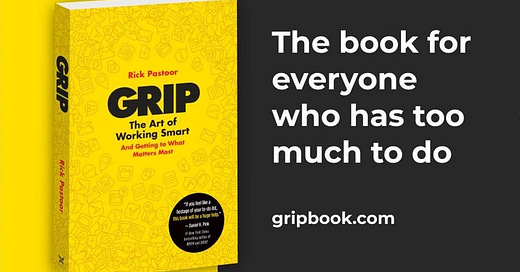Top tips from readers for beating stress
Hi,
Last week I asked what works for you when the stress hits. And the tips poured in, thanks so much! Today I’m sharing some of your best suggestions.
My own top tip for lowering work stress is creating a YearPlan you’re excited about. Those of you who preorder the book get that chapter in your inbox right away. It’s good fun to do over the holidays. You can order at gripbook.com
Ok, here we go:
Here’s what readers do when stress hits
When Harry gets stressed, he takes a walk. Walking helps him get some perspective, especially when he’s stuck on something at work. I have the tendency to not leave my desk in that situation, especially when a deadline’s looming. Harry gets that: “It takes guts to walk away when work’s waiting, but in my experience, that kind of break wins you more time than you lose.”
Padraig points out that stress and emotions are often closely linked. Write out what you’re feeling; that brings instant relief. At the same time, it helps you develop new insight that you can look back on later. What also appeals to me: by writing down your thoughts and feelings, you make it easier to share what you’re going through with the people around you.
Frank has two components to add to my checklist: 1) What’s urgent that I should’ve started on yesterday? And 2) out of everything on my list, what’s the 20% of my work that’s sure to yield 80% of my results? Excellent additions.
Martijn: “In that case, I make myself take half an hour to sort out my schedule. My reflex is to run around putting out fires and forget all about my calendar. But then the danger, of course, is that I’ll lose my overview and inadvertently spark a new fire in my wake.”
Sound familiar? The idea of making yourself take the time is key here. It can feel unnatural to slow down and take a moment before springing into action. Martijn adds another two relevant pitfalls: 1) Diving straight into complex issues when you’ve still got loose ends to resolve first that would create more headspace. And 2) stressing to meet the deadlines of others—when those are often not as firm as you might think.Varinia says, “When I’m stressed, I shut my laptop and grab a pad of sticky notes. I then take as much time as I need to get everything out of my head, jotting down all the things I need to do, one per note. Everything from to-dos for projects at work to fix-it jobs around the house—whatever’s taking up space in my brain.”
Sometimes just shifting gears to non-digital notetaking does wonders. It helps you see the work in a different light. Another reader recommends Workflowy for making quick and easy lists. Switching tools can also give you a fresh perspective.Arjan suggests making a quick list and applying Mel Gibson’s 5-second rule: Count down from 5 to 1 and then take action. The countdown apparently fires you up—no idea if it’s proven to work, but maybe worth a shot if you’re short on motivation.
Marloes gives self-care a spot on her schedule, especially in stressful times. Otherwise, it’s the first thing we skip under pressure, she explains. “Whether it’s exercising, reading, or doing something with the kids. I put it on the calendar, as a fixed appointment, even if it’s just 30 minutes. At the end of the day, that’s really satisfying: knowing I’m worth as much energy and attention as all those other to-dos on my list.”
I wholeheartedly agree. Though I have to add that this tweet from Adam Grant gave me pause: A group of thirteen studies seem to show we’re less enthusiastic about planned fun than we are about the spontaneous variety. Something to consider.
Another reader wrote that we almost always know when a busy season is coming. Make room for the extra work by clearing time in your workweek or arranging for some overtime throughout the period (spanning, say, a couple weeks or a month). Outside this scheduled time, you give a firm “No” to just about every request.
You could start the workday one hour earlier for the duration, or reserve one evening a week for a month. The best part: this reader has found it gives you a sense of calm and peace of mind in what would otherwise be a hectic time. And you often won’t even need all the hours you’ve set aside.Mari swears by the Headspace app. Focusing on breathing—even momentarily—lowers stress on the spot, because when we’re under pressure, we tend to take quick and shallow breaths. The amount of time an exercise like this takes is negligible. Some Headspace exercises can be completed in just one minute.
Hope there’s an experiment in there for you to try this week!
Have a good one,
Rick
produced by the language girl



